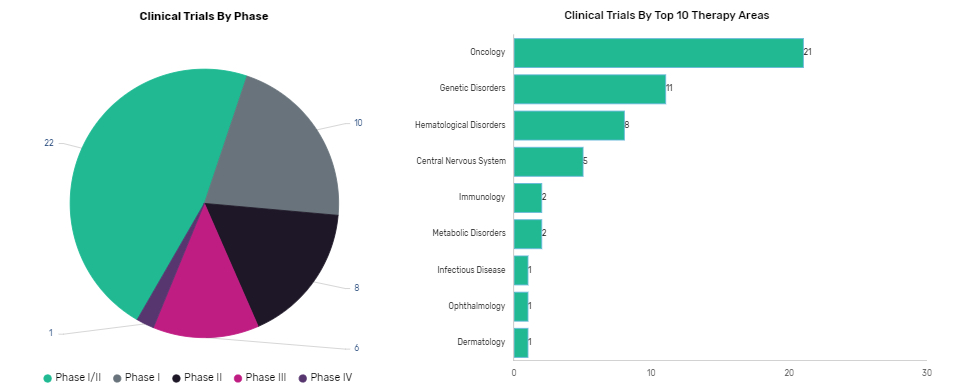Newsletter Signup - Under Article / In Page
"*" indicates required fields
Amid the Covid-19 pandemic, gene therapy companies are suffering, with clinical trials delayed and investors remaining cautious in an increasingly volatile market. Yet many have set their sights on what could potentially turn into a gold mine: applying their technology to contain the spread of the novel coronavirus.
The UK’s Cell and Gene Therapy Catapult is the latest example of these uncertainty dynamics — last week, it received a £100M investment from the UK government to boost its manufacturing capacity in order to scale up the country’s ability to make Covid-19 vaccines, once a vaccine is approved. With this investment, the center will be able to produce millions of doses of vaccine a month.
Gene therapy companies are particularly well-positioned to research and manufacture Covid-19 vaccines, since they often employ viral vectors to get genes into cells. These same vectors could also be used to carry genetic material from the coronavirus in order to elicit an immune response.
“The Covid-19 pandemic has prompted many companies to highlight the potential of their programs for treating this disease. Gene therapy is no exception, and indeed several vaccine programs are employing gene therapy,” said Stephan Christgau, co-founder and Managing Partner of EiR Ventures, who pointed out at companies such as Moderna, BioNTech and the CGT Catapult.
“Data will show whether this approach works for the coronavirus, and, as an investor, ultimately data is king.”
Many gene therapy companies may see the opportunity to join the struggle against Covid-19 as life support. When it comes to traditional gene therapies — such as those targeting cancer or rare genetic diseases — recent data paints a bleak picture.
According to analytics firm GlobalData, 59 gene therapy clinical trials involving 80 drugs and 63 companies have been delayed to date due to the pandemic. The main reasons being that hospitals are overwhelmed and lockdown measures have limited patient access to clinical trials.

“It certainly has gone quiet in cell and gene therapeutic products,” a representative of Voisin Consulting, a Paris-based life sciences consultancy, told me. Delayed clinical trials, reduced patient enrollment, and possible regulatory delays alongside wavering investor confidence likely contribute to that situation, she added.
These statistics mirror widespread delays of other non-emergency treatments and interventions. The problem is so significant that many experts fear a flood of undiagnosed cancers and other life-threatening diseases down the road.
On top of that comes the roaring economic crisis that lockdowns are triggering around the globe, which may force gene therapy developers to radically rethink their business model. The therapies they provide, even those that are still experimental, are often hugely expensive, often running into the hundreds of thousands or even millions of dollars for a single course of treatment.
“Due to the economic recession in most of the countries worldwide, governments will discuss more carefully with pharma companies and payers how to price these high-cost therapies, as the healthcare system is already under pressure,” Alessio Brunello, Senior Pharma Analyst at GlobalData, told me. “The important factor in addressing this issue could be lowering production costs.”
“There is a clear mid to long-term impact resulting from Covid-19 pandemic such as clinical trials slowing down, therefore impacting the amount of data available for companies to secure more funding; or prioritization of facilities for COVID-19 work to delay commitment of companies coming to the UK,” said a representative from the CGT Catapult.
“This however may present opportunities for the cell and gene therapy industry in the UK and its ecosystem in the long run. For instance, the distance between manufacturing facilities may be reduced as companies realize that in such circumstances they would want to ensure easy access to them. This may well result in increased clustering of facilities. The UK already has the largest cluster of cell and gene therapy companies outside of the US and this will remain a key asset to ensure business continuity, similarly international companies already setup in the UK may be more likely to centralize operations here.”
Cover image via Shutterstock, figures courtesy of GlobalData






